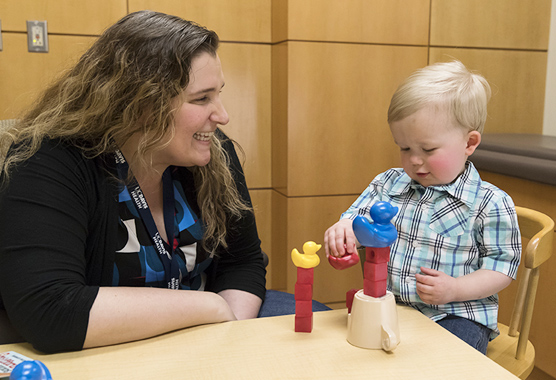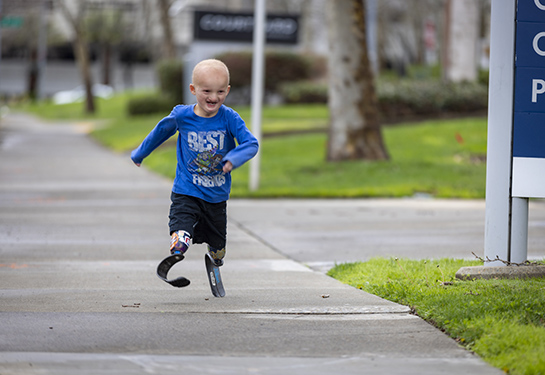Developmental Conditions
Our expert team of developmental behavioral pediatricians, psychologists and social workers offers family-focused care for developmental conditions. We blend research, education and clinical excellence to help children and teens reach their full potential.
Medically reviewed by Roger Scott Akins, D.O. on Dec. 07, 2023.

Support and Care for Families
The UC Davis MIND Institute gives more families who have children with developmental disabilities access to the care they need. Our focus is on research, education, clinical intervention and evidence-based therapies. We help children thrive at home, at school and in their communities.
We’re nationally recognized for our expertise in autism, attention-deficit/hyperactivity disorder (ADHD), fragile X syndrome, Down syndrome, 22q11.2 deletion syndrome and other neurodevelopmental conditions. A multispecialty team provides individualized assessments, referrals and support services for the entire family. Together, we help you plan for the future.
Our Difference
Center for Excellence in Developmental Disabilities
We are a University Center for Excellence in Developmental Disabilities and one of only 67 centers in the nation with this designation. This means we connect our university and our community with the shared goal of improving access to services for people living with neurodevelopmental conditions.
Innovative Research
The MIND Institute is an international research center for neurodevelopmental conditions. Our physicians and scientists work to better understand conditions such as autism, ADHD, Down syndrome, Fragile X syndrome and intellectual disabilities.
Multispecialty Clinics
Developmental and behavioral pediatricians, psychologists, geneticists and social workers work together to deliver complete care to children and young adults.
What Are Developmental Conditions?
Developmental conditions affect a person’s ability to move, learn, speak and behave. Developmental disabilities are often apparent very early in life. Young children may not meet developmental milestones such as sitting up, playing games, saying words or holding objects. Or sometimes children lose skills they briefly had, which is called regression.
Types of Developmental Conditions
There are many types of developmental conditions. They can affect brain function, behavior, language and movement.
Some common forms include attention-deficit/hyperactivity disorder (ADHD), autism and Down syndrome.
Causes of Developmental Conditions
Developmental conditions can have many causes. They usually begin when a fetus is developing in the womb. These conditions can be the result of abnormal changes to genes, or missing or extra chromosomes. Maternal infections or exposure to harmful substances during pregnancy can also affect fetal development.
But developmental challenges can happen after birth, too. They may be the result of childbirth complications, such as a preterm birth. Severe infections or traumatic brain injuries during infancy or early childhood can also cause developmental disabilities.
Monitoring and Screening for Developmental Conditions
We can do developmental monitoring to track how well your child is meeting milestones, usually between the ages of 2 months and 5 years.
Your pediatrician can provide a detailed list of age-specific milestones. Talk to your pediatrician if you notice your child isn’t completing tasks, communicating, moving or learning at the same rate as other children their age.
If you have concerns, your child’s health care provider can do a full developmental screening. A screening is a series of tests and questions that help providers identify developmental delays and conditions
It's important to talk to a health care provider right away if you have any concerns about your child’s development. Early intervention is key to helping them develop the skills they need to live as fully and independently as possible.
Our Specialty Areas
We have experience evaluating and treating a wide range of developmental disabilities. Our range of outpatient clinics and programs provides support and guidance to patients and families. Our experts help every individual reach their full potential — physically, emotionally and socially.
Our specialty areas include:
Attention-Deficit/Hyperactivity Disorder
ADHD is a common neurodevelopmental condition that can make it difficult to concentrate, sit still or control your behavior. Medication and behavioral therapy can help people manage symptoms, focus and improve overall function. The MIND Institute provides care for children who have ADHD that occurs along with another neurodevelopmental condition such as autism.
Autism
Autism is a developmental condition that can affect behavior, communication and learning. Problems with communication and social interactions tend to appear early in life, such as an inability to use words or engage with others. Behavioral challenges may develop later, such as obsessive repetition or strong sensory reactions.
Down Syndrome
Down syndrome, also known as Trisomy 21, is a genetic condition resulting from an extra copy of chromosome 21. It leads to developmental and intellectual delays. People with Down syndrome often have distinctive physical features, as well as issues with motor skills, behavior and learning.
Fragile X Syndrome
Fragile X syndrome is an inherited condition. It’s the result of a change in a gene responsible for brain development. It can lead to developmental delays, ADHD, autism and a range of challenges with learning and behavior.
22q11.2 Deletion Syndrome
22q11.2 deletion syndrome, also known as DiGeorge syndrome, occurs when part of chromosome 22 is missing. The condition causes developmental delays and intellectual disability, as well as heart defects, immune system problems and many other issues.
Request an Appointment
As Sacramento's No. 1 hospital, you'll benefit from unique advantages in primary care and specialty care. This includes prevention, diagnosis and treatment options from experts in 150 specialties.
Referring Physicians
To refer a patient, submit an electronic referral form or call.
800-4-UCDAVIS
Patients
Call to make an appointment.

